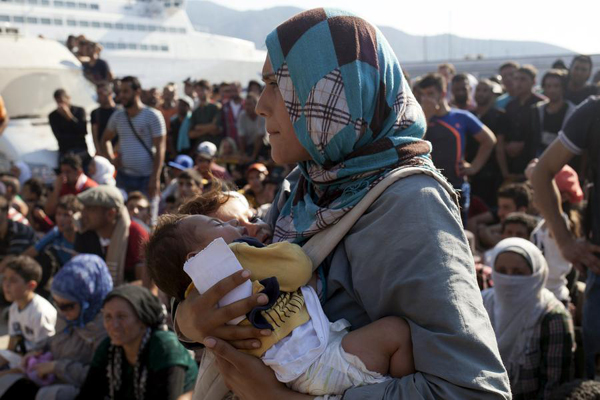Schengen under threat if EU fails to reach common migration policy
(Xinhua) Updated: 2015-09-09 09:09
 |
|
A migrant woman carries two babies as she waits for a registration procedure at the port of Mytilene on the Greek island of Lesbos, September 5, 2015. [Photo/Agencies] |
GENEVA - Special Representative of the UN Secretary-General for Migration and Development Peter Sutherland told the press on Tuesday the "Schengen most definitely could fall apart if we don't get a common European policy in respect of migration."
"If we have a situation where one, two, three, four, or indeed currently five countries take 72 percent of the total refugee community, and others take much less, some virtually none, the inevitable consequence over time will be that the political pressure placed on those who are most generous will become more and more difficult," he explained.
While finding proactive solutions to the problem of refugee and migrant arrivals on European soil was described as pivotal by Sutherland, he also iterated the importance of making each state commit to taking in refugees as well as financially contributing to dealing with the crisis through mechanisms which "allows for public demand for each country to make its contribution."
To emphasize the need for an urgent global response to deal with what he described as "humanitarian obligations", the Irishman also laid out the financial shortfalls prevailing within aid agencies' budgets.
"The United Nations Refugees Agency (UNHCR) budget is now overburdened by far. The 1.4 billion U.S. dollar UNHCR budget for four million Syrians is covered to only 41 percent of the total amount required. The World Food Programme (WFP) is cutting food assistance to 1.6 million refugees for lack of funds. Schools in Jordan, Lebanon and Turkey are unable to receive any more children, while the United Nations Children's Fund (UNICEF) cannot maintain its support," he said.
To deal with these pressing challenges, Sutherland called for "a European response as part of a global response" while cautioning that "coherence is going to require leadership. And leadership before we see the destruction of great achievements like the Schengen Agreement...one of the great achievements of the European Union and one of the most beneficial aspects of public policy to the very states who are refusing to be part of a common European policy, particularly in central and eastern Europe."
The 69-year-old also admitted that he personally thought that the Dublin Regulation didn't work as it placed an unfair burden on countries such as Greece and Italy, where most refugees and migrants arrive, having crossed the Mediterranean from countries such as Turkey and Libya.
"History will judge this as a defining moment for Europe, a Europe that proclaimed itself to be created on the principle of values," Sutherland stated.






